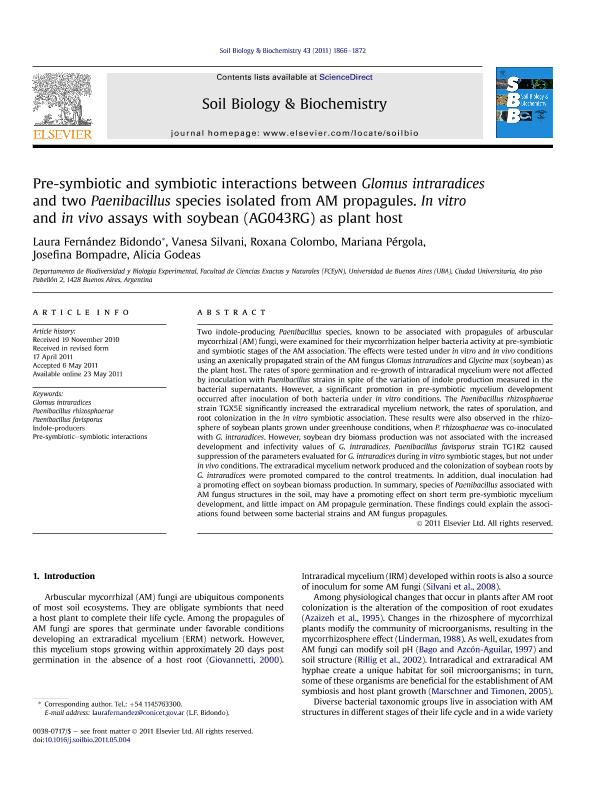Artículo
Pre-symbiotic and symbiotic interactions between Glomus intraradices and two Paenibacillus species isolated from AM propagules: In vitro and in vivo assays with soybean (AG043RG) as plant host
Fernandez Bidondo, Laura ; Silvani, Vanesa Analia
; Silvani, Vanesa Analia ; Colombo, Roxana
; Colombo, Roxana ; Pergola, Mariana; Bompadre, Maria Josefina
; Pergola, Mariana; Bompadre, Maria Josefina ; Godeas, Alicia Margarita
; Godeas, Alicia Margarita
 ; Silvani, Vanesa Analia
; Silvani, Vanesa Analia ; Colombo, Roxana
; Colombo, Roxana ; Pergola, Mariana; Bompadre, Maria Josefina
; Pergola, Mariana; Bompadre, Maria Josefina ; Godeas, Alicia Margarita
; Godeas, Alicia Margarita
Fecha de publicación:
09/2011
Editorial:
Pergamon-Elsevier Science Ltd
Revista:
Soil Biology And Biochemistry
ISSN:
0038-0717
Idioma:
Inglés
Tipo de recurso:
Artículo publicado
Clasificación temática:
Resumen
Two indole-producing Paenibacillus species, known to be associated with propagules of arbuscular mycorrhizal (AM) fungi, were examined for their mycorrhization helper bacteria activity at pre-symbiotic and symbiotic stages of the AM association. The effects were tested under in vitro and in vivo conditions using an axenically propagated strain of the AM fungus Glomus intraradices and Glycine max (soybean) as the plant host. The rates of spore germination and re-growth of intraradical mycelium were not affected by inoculation with Paenibacillus strains in spite of the variation of indole production measured in the bacterial supernatants. However, a significant promotion in pre-symbiotic mycelium development occurred after inoculation of both bacteria under in vitro conditions. The Paenibacillus rhizosphaerae strain TGX5E significantly increased the extraradical mycelium network, the rates of sporulation, and root colonization in the in vitro symbiotic association. These results were also observed in the rhizosphere of soybean plants grown under greenhouse conditions, when P. rhizosphaerae was co-inoculated with G. intraradices. However, soybean dry biomass production was not associated with the increased development and infectivity values of G. intraradices. Paenibacillus favisporus strain TG1R2 caused suppression of the parameters evaluated for G. intraradices during in vitro symbiotic stages, but not under in vivo conditions. The extraradical mycelium network produced and the colonization of soybean roots by G. intraradices were promoted compared to the control treatments. In addition, dual inoculation had a promoting effect on soybean biomass production. In summary, species of Paenibacillus associated with AM fungus structures in the soil, may have a promoting effect on short term pre-symbiotic mycelium development, and little impact on AM propagule germination. These findings could explain the associations found between some bacterial strains and AM fungus propagules.
Archivos asociados
Licencia
Identificadores
Colecciones
Articulos(IBBEA)
Articulos de INSTITUTO DE BIODIVERSIDAD Y BIOLOGIA EXPERIMENTAL Y APLICADA
Articulos de INSTITUTO DE BIODIVERSIDAD Y BIOLOGIA EXPERIMENTAL Y APLICADA
Articulos(INBA)
Articulos de INST.DE INVEST. EN BIOCIENCIAS AGRICOLAS Y AMBIENTALES
Articulos de INST.DE INVEST. EN BIOCIENCIAS AGRICOLAS Y AMBIENTALES
Articulos(OCA PQUE. CENTENARIO)
Articulos de OFICINA DE COORDINACION ADMINISTRATIVA PQUE. CENTENARIO
Articulos de OFICINA DE COORDINACION ADMINISTRATIVA PQUE. CENTENARIO
Citación
Fernandez Bidondo, Laura; Silvani, Vanesa Analia; Colombo, Roxana; Pergola, Mariana; Bompadre, Maria Josefina; et al.; Pre-symbiotic and symbiotic interactions between Glomus intraradices and two Paenibacillus species isolated from AM propagules: In vitro and in vivo assays with soybean (AG043RG) as plant host; Pergamon-Elsevier Science Ltd; Soil Biology And Biochemistry; 43; 9; 9-2011; 1866-1872
Compartir
Altmétricas



